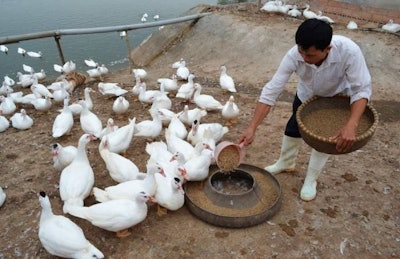
An international effort to educate Vietnamese farmers in poultry husbandry and biosecurity efforts is yielding promising results.
The year-long joint effort between the World Poultry Foundation (WPF) and the Food and Agriculture Organization of the United Nations (FAO) aimed to improve the husbandry practices of small and mid-sized Vietnamese hatchery owners, particularly biosecurity, and to strengthen the expertise of local experts in their support network. The program was launched in 2014 and recently concluded.
The WPF offered training for hatchery owners and operators in northern Vietnam. The project resulted in improved productivity and profitability, enhanced good management practices and increased biosecurity in Vietnamese hatcheries.
A release from the WPF said its work in Vietnam will help prevent the spread of disease and enhance the livelihood of farmers. CEO Randall Ennis said the organizations support will advance the FAO’s mission of transboundry animal disease control in Southeast Asia.
An FAO webpage on the project said the WPF provided support after the project was launched by the United States Agency of International Development in collaboration with the FAO and Vietnamese authorities. After a pilot phase working with a small number of farmers the WPF helped to broaden the training in the country.
The FAO said small and mid-sized Vietnamese farmers lack guidance and experience in implementing and maintaining clean and safe farm operations. Poor biosecurity practices lead to low quality products and the spread of disease like H5N1 highly pathogenic avian influenza. The disease has persisted in Vietnam since 2003 and threatens food safety and poultry farming in the country.
Duck farmers that took place in the pilot training project in Quang Tri and Can Tho provinces gained between USD 271 and USD 4,327 in additional income thanks to increased hatchability gained by following biosecurity practices developed in the FAO program. The WPF provided funding to develop a training manual designed to used by a larger group of small hatchery owners in Vietnam.
The World Poultry Foundation is a non-profit organization that promotes economic development in developing nations by providing education and technical training on poultry production. In addition to Vietnam the WPF is working on projects in Ghana, South Africa and other developing nations.


















